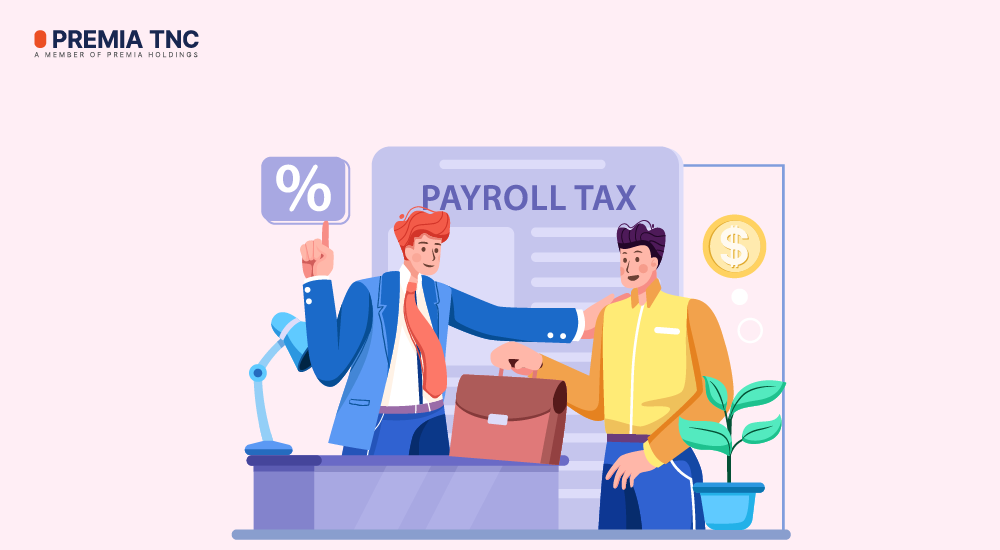Blog


Taipei Business Location Pre-Check: What Entrepreneurs Must Know Before Company Registration
Starting a business in Taipei requires careful planning, and one of the most crucial steps before company registration is the business location pre-check. While the Ministry of Economic Affairs provides standardized forms and documents for company registration across Taiwan, Taipei City imposes an additional requirement: a pre-approval of the business address to ensure compliance with zoning and building regulations.


Taiwan Retail “Points Economy”: Market Scale and Industry Trends
In recent years, Taiwan’s retail sector has been experiencing a strategic shift in customer engagement, with loyalty programs and pointbased incentives becoming central to how brands attract and retain consumers.


How to Change Your Registered Office Address in Singapore: A Step-by-Step Guide
If you are a foreign entrepreneur planning to incorporate a company in Singapore, understanding the identification framework used by Singapore’s regulatory authorities is crucial. Two terms you will encounter are the Unique Entity Number (UEN) and the ACRA registration number. Though they are related, there are important distinctions and nuances, especially if your entity was incorporated before 2009. This article explains what the UEN and ACRA registration number are, how they work, why they matter in your business setup, and what you need to do to ensure your company remains fully compliant.


Vietnam’s Personal Income Tax: What Foreign Entrepreneurs Should Consider
Vietnam’s rapidly growing economy and burgeoning entrepreneurial landscape present an appealing environment for foreign investors. However, navigating the local tax system, particularly personal income tax (PIT), is a crucial aspect that every foreign entrepreneur must understand.


Vietnam – Singapore: Partners for a New Era
The relationship between Vietnam and Singapore is one of the most vibrant and mutually advantageous in Southeast Asia. With both countries positioning themselves at the forefront of regional and global challenges, the strategic partnership is entering a new chapter.


Legal Framework for Energy Transition in Vietnam
The world is increasingly recognizing the urgency of transitioning to cleaner, more sustainable energy sources to mitigate the impacts of climate change


Pre-Launch Checklist for Foreign Businesses Entering the Vietnamese Market Introduction
Vietnam’s market has steadily emerged as one of the most dynamic and attractive destinations for foreign businesses. With a young, tech-savvy population, a robust economy, and strategic positioning within ASEAN, the country offers immense opportunities for growth and expansion.


The Relation Between ESG and Foreign Direct Investment Flows in Vietnam
The world of investment has evolved significantly over the past few decades. Among the key drivers of this transformation are the concepts of ESG—Environmental, Social, and Governance. These principles have gained prominence not only in corporate governance but also in shaping the patterns of foreign direct investment (FDI) flows across the globe.


What You Need to Know About Taxation for Foreign-Owned Businesses in Vietnam
Vietnam’s booming economy has attracted a surge of foreign investors seeking to tap into one of Southeast Asia’s most dynamic markets. As the government continues to open its doors to global businesses, understanding the complexities of Vietnam’s taxation system is essential for foreign-owned enterprises looking to thrive.


A Comprehensive Guide to the Hong Kong Dependant Visa
The Hong Kong Dependant Visa is an essential option for foreign nationals seeking to reunite with their family members in Hong Kong. This visa allows the spouse, children, and in some cases, other dependents of Hong Kong residents to live and work in the region. This guide will outline what the Hong Kong Dependant Visa is, who qualifies for it, and how to apply for it.


Dubai Mainland Company vs ADGM/DMCC vs Free Zone: A Comparison of Company Formation Types
In this blog post, we will compare the Dubai Mainland Company, ADGM/DMCC, and Free Zone options, focusing on their setup processes, features, advantages, and disadvantages to help businesses make the best choice for their needs.


What You Need to Know About Importing Cosmetics into Hong Kong
When importing cosmetics into Hong Kong, businesses need to understand the regulatory requirements regarding product ingredients. While the importation of cosmetics is relatively straightforward, if the product contains pharmaceutical ingredients, the process becomes more complex.


Mastering eCommerce Law in Vietnam: What You Need to Know to Stay Compliant
In recent years, Vietnam has become one of the fastest-growing markets for eCommerce in Southeast Asia. As businesses embrace the digital economy, understanding the intricate web of laws regulating online trade becomes essential.


Labor Costs and Human Resources Advantages When Establishing a Company in Vietnam
As Vietnam continues to experience rapid economic growth, it has positioned itself as an attractive destination for foreign investment. One of the key factors influencing business decisions when establishing a company in the country is the labor market, which offers a mix of competitive labor costs and an increasingly skilled workforce.


How to Change Your Registered Office Address in Singapore: A Step-by-Step Guide
If you are a foreign entrepreneur planning to incorporate a company in Singapore, understanding the identification framework used by Singapore’s regulatory authorities is crucial. Two terms you will encounter are the Unique Entity Number (UEN) and the ACRA registration number. Though they are related, there are important distinctions and nuances, especially if your entity was incorporated before 2009. This article explains what the UEN and ACRA registration number are, how they work, why they matter in your business setup, and what you need to do to ensure your company remains fully compliant.


Capital Reduction for Singapore Companies: A Strategic Move for Business Restructuring
If you are a foreign entrepreneur planning to incorporate a company in Singapore, understanding the identification framework used by Singapore’s regulatory authorities is crucial. Two terms you will encounter are the Unique Entity Number (UEN) and the ACRA registration number. Though they are related, there are important distinctions and nuances, especially if your entity was incorporated before 2009. This article explains what the UEN and ACRA registration number are, how they work, why they matter in your business setup, and what you need to do to ensure your company remains fully compliant.


Vietnam’s Tax Policy: Tax Exemption When Investing in High-Tech Industries
Vietnam’s economic landscape is rapidly evolving, driven by innovation, infrastructure development, and a growing focus on high-tech industries. In recent years, the Vietnamese government has placed an emphasis on fostering technological advancements and creating an environment conducive to investment in high-tech sectors. One of the most significant initiatives to encourage foreign and domestic investment in this area is Vietnam’s tax exemption policy, which provides generous tax relief to investors who focus on high-tech industries.


Green Business Development: Opportunity for FDI Investors in Vietnam
Vietnam, one of Southeast Asia’s most dynamic economies, is rapidly emerging as a hub for green business development. As the world increasingly shifts towards sustainability, Vietnam is positioning itself as an attractive destination for Foreign Direct Investment (FDI), particularly in sectors that contribute to environmental preservation.


How to Stay Legally Compliant in Vietnam’s Manufacturing Industry
Vietnam’s manufacturing sector has become a cornerstone of its rapidly growing economy. As the country continues to be a hub for both local and international manufacturing businesses, staying legally compliant is crucial to avoid financial and operational risks. Manufacturers in Vietnam must navigate a complex regulatory environment, balancing the demands of national laws, international standards, and industry-specific regulations. This article outlines key legal considerations and practical steps manufacturers must take to ensure full compliance with Vietnamese law.


Retail Business in Vietnam: Legal Guide for Foreign Investors in 2025
Vietnam’s retail market has witnessed an incredible transformation in recent years, with its burgeoning middle class and increasing consumer demand positioning it as one of Southeast Asia’s most dynamic markets. The country’s rapid urbanization and evolving consumer behavior make it an attractive destination for foreign investors.


Impact of UAE Ministry of Economy (NAFIS) Policy Changes on Foreign Companies (2026)
As the UAE moves toward its long-term economic vision, Emiratisation has become a central pillar of national policy.
At the heart of this initiative lies NAFIS, a government-led program overseen by the UAE Ministry of Economy and the Ministry of Human Resources & Emiratisation (MOHRE).
While NAFIS was once viewed as a concern mainly for large local employers, policy developments leading into 2026 make it increasingly relevant for foreign-owned and multinational companies operating in the UAE—including Free Zone entities.


Managing Legal Risks When Investing in Vietnam
Vietnam has emerged as one of Southeast Asia’s most attractive investment destinations in recent years. With its rapidly growing economy, expanding middle class, and a host of favorable trade agreements, foreign investors are increasingly eager to tap into the opportunities that the country offers. However, along with these promising opportunities come certain legal risks that investors must carefully manage. Understanding the legal landscape in Vietnam is critical for ensuring the protection of assets, mitigating potential liabilities, and navigating the complex regulatory environment effectively.


The Complete Guide to Vietnam’s Labor Laws: What Every Employer Needs to Know
Vietnam’s labor laws form the backbone of its employment landscape, providing a clear structure for employers and employees alike. These laws, rooted in both historical and economic contexts, are designed to ensure fairness, safety, and equitable treatment in the workplace. For employers, understanding and adhering to these legal requirements is not only a moral duty but also a legal one, with non-compliance leading to serious ramifications such as fines or reputational damage. This guide delves into the essential aspects of Vietnam’s labor laws, highlighting key obligations and offering insights into how employers can navigate the complexities of employment regulation.


Opportunities for Enterprise Processing Export in Vietnam
As one of Southeast Asia’s most dynamic economies, Vietnam has emerged as a prominent player in global trade, particularly in the realm of export processing. The country’s rapid industrialization, government support, and strategic location have made it an increasingly attractive destination for businesses involved in enterprise processing export (EPE). This article explores the vast opportunities available in Vietnam for companies looking to engage in EPE, analyzing the favorable economic conditions, governmental policies, and industry sectors primed for growth.


Huge Potential of the Cosmetics Industry in Vietnam
The global cosmetics sector has undergone remarkable expansion, with an ever-growing demand for skincare and beauty products. Among the emerging markets, Vietnam stands out as an increasingly influential player in the beauty industry. With its vibrant culture, fast-paced economic development, and evolving consumer preferences, Vietnam is creating significant opportunities for both local and global cosmetic brands.


Current Regulations on Condotel Business in Vietnam
The condotel industry in Vietnam has witnessed remarkable growth in recent years, driven by the country’s booming real estate market and tourism sector. Condotels—hybrid properties that combine the features of residential apartments and hotel accommodations—offer investors a unique opportunity to generate rental income while also enjoying the benefits of hotel-like services. However, as the sector expands, navigating the legal and regulatory landscape becomes crucial for investors, developers, and stakeholders. This article explores the current regulations surrounding the condotel business in Vietnam, covering topics such as ownership rights, taxation, leasing, and construction.


Investing in Vietnam’s Tourism Sector: Opportunities and Challenges for Foreign Investors
Vietnam’s tourism sector has experienced remarkable growth over the last decade, making it an increasingly attractive destination for foreign investors. With its rich culture, diverse landscapes, and burgeoning infrastructure, the country is poised to become one of the leading tourism hubs in Southeast Asia. However, like any emerging market, foreign investors in Vietnam’s tourism industry face both significant opportunities and challenges that require careful consideration.


Taiwan Consumer Goods Industry Overview: Key Market Trends and Growth Opportunities
The consumer goods industry in Taiwan is a vital component of the nation’s economy, reflecting both its industrial sophistication and consumer dynamism. Taiwan’s strong manufacturing base, skilled workforce, and advanced supply chain infrastructure have enabled it to produce and distribute a wide range of consumer products—from electronics and home appliances to fashion, food, and personal care items. The industry is characterized by a blend of traditional craftsmanship, technological innovation, and global competitiveness, which collectively position Taiwan as a significant player in the regional and global consumer market.


Top 10 Fastest-Growing Business Licenses in Dubai for 2026
Dubai continues to be one of the world’s most dynamic business hubs, attracting global entrepreneurs, digital businesses, investors, and fast-scaling startups. In 2026, several license categories are projected to grow rapidly due to regulatory changes, digital transformation, increased foreign ownership freedom, and strong government support for innovation. Based on market trends, government updates, and real cases handled by Premia TNC, we have selected the Top 10 fastest-growing business licenses expected to dominate Dubai in 2026.


Trademark Registration and Protection in the UAE: Everything You Need to Know
If you’re doing business or planning to do so in the UAE, it’s essential to recognize the importance of trademark registration. In this blog, we will explore the UAE’s trademark system, the trademark registration process, and international trademark protection through the Madrid Protocol.


How to Import Vitamins into Hong Kong: Licensing Requirements & Compliance Guide
Hong Kong is a prime hub for the importation and distribution of health products, including vitamins. However, to operate smoothly and legally, businesses must understand the essential vitamin importation regulations set by the Hong Kong government. Navigating the licensing process correctly is crucial to ensure compliance with local laws, avoid costly fines, and maintain your business’s reputation. Here’s a detailed guide to understanding what you need to do when importing vitamins into Hong Kong.


How PREMIA TNC LIMITED Can Assist You with Company Formation and Hong Kong Residency
If you’re a foreigner looking to establish a business in Hong Kong and secure residency, navigating the local regulatory environment can be daunting. Partnering with a professional company secretarial service like PREMIA TNC LIMITED can simplify the process, ensuring your company is set up correctly and helping you achieve your residency goals. This article outlines how PREMIA TNC LIMITED can assist you in establishing a Hong Kong company and obtaining residency.


Potential Industries for Foreign Investors in Vietnam in 2025
Vietnam has emerged as one of Southeast Asia’s most dynamic economies, with consistent growth projections for the coming years. The nation’s strategic location, improving infrastructure, and a young, tech-savvy workforce make it an appealing destination for foreign investment.


The Evolution of E-Commerce: Trends Shaping the Future of Online Shopping
E-commerce has come a long way since its inception in the 1990s. What started as a niche way to buy books and electronics has evolved into a global powerhouse, transforming the way we shop and interact with brands. With advancements in technology, shifts in consumer behavior, and a rapidly changing global marketplace, the future of online shopping is exciting and full of potential. In this blog, we’ll explore the latest trends in e-commerce and how they’re shaping the future of online retail.


Vietnam Market Entry: Drug and Medicine Business for Foreign Investors
Vietnam’s pharmaceutical sector is a dynamic and rapidly evolving market that has garnered significant attention from foreign investors worldwide. Positioned at the crossroads of Southeast Asia, Vietnam boasts a population exceeding 100 million, with a burgeoning middle class and increasing healthcare expenditures that collectively fuel robust demand for pharmaceutical products. Over the past decade, Vietnam’s healthcare infrastructure has undergone profound improvements, driven by public and private sector initiatives, thereby cultivating an environment ripe for pharmaceutical growth.


Impact of Law on Data 2024 to Vietnam Enterprises
Vietnam’s digital economy is burgeoning, driven by rapid technological adoption and an expanding internet user base. As digital transactions proliferate, the legal landscape governing data has grown in complexity and significance. In 2024, Vietnam’s data protection laws have evolved to meet international standards, reflecting the government’s commitment to safeguarding personal information while fostering economic development. For enterprises within Vietnam, navigating these legal frameworks is critical to ensuring compliance, maintaining customer trust, and harnessing data as a strategic asset. The intersection of law and data management presents both challenges and opportunities, shaping the future of Vietnam’s business ecosystem.


How to Extend Your Foreign-Invested Education Project in Vietnam
Vietnam’s rapidly developing education sector offers a wealth of opportunities for foreign investors looking to make a mark. Foreign-invested education projects, especially those in higher learning and international schools, have seen remarkable success over the past decade.


Legal Risks of Retailing Imported Goods in Vietnam and How to Prevent Them
The retail market in Vietnam has become a hub for imported goods, drawing retailers from around the world seeking to capitalize on the growing demand for foreign products.


Dubai Mainland vs Free Zone Checklist 2026: Which Business Structure Is Right for You?
Dubai remains one of the world’s most attractive destinations for global entrepreneurs, e-commerce sellers, investors, and multinational companies.


2026 Dubai Free Zone Regulatory Changes: 7 Critical Updates Every Business Must Know
As Dubai continues strengthening its position as a global business hub, significant regulatory updates will take effect in 2026 across major Free Zones. While Free Zones remain attractive for foreign investors, the latest compliance, tax, and visa rules will directly impact how companies must operate from 2026 onward.


Unveiling Vietnam’s FMCG Sector: Investment Prospects and Challenges
Vietnam’s fast-moving consumer goods (FMCG) sector stands as one of Southeast Asia’s most vibrant and swiftly evolving markets. Over the past twenty years, the country’s consistently strong economic growth has cultivated fertile ground for consumer-driven expansion. At the heart of this growth lies a youthful demographic, rapid urban development, and an expanding middle-income class increasingly seeking not just volume but also quality and variety in their consumption. This energetic consumer landscape presents compelling opportunities for FMCG enterprises ready to harness the shifting dynamics.


Maximizing Business Growth Through Strategic Tax Planning and Financial Resilience
In the ever-shifting landscape of global commerce, the concept of financial resilience has become indispensable for businesses striving to not only survive but thrive. Financial resilience denotes a company’s capacity to absorb and recover from adverse economic events, adapt to market turbulence, and continue its growth trajectory despite potential setbacks. Far from being a mere survival tactic, true financial resilience requires adept strategic planning, operational flexibility, and the ability to capitalize on emerging opportunities, even amid crises.


Taiwan eCommerce Tax Compliance: A Guide to KOL & Influencer Partnerships for Foreign Companies
Taiwan is one of Asia’s most mature and fast-growing digital markets. With exceptionally high social media penetration and strong eCommerce adoption, influencer marketing has become a crucial channel for brands entering Taiwan. Foreign companies that establish subsidiaries or branches in Taiwan frequently rely on local KOLs and influencers to accelerate brand exposure, improve consumer trust, and drive marketplace sales.


The Importance of FDI Enterprises in Vietnam
Foreign Direct Investment (FDI) represents more than just the transfer of capital across borders; it embodies the establishment of long-term economic relationships, involving ownership and management control in foreign enterprises. In the context of global economics, FDI is a key driver of globalization, enabling the flow of technology, managerial expertise, and capital to emerging economies. Vietnam has emerged as a compelling destination for FDI, transforming itself into a pivotal player in Southeast Asia’s economic sphere. Its combination of strategic location, a young and dynamic workforce, and progressive economic policies have made it an increasingly attractive option for multinational corporations.


Understanding Anti-Bribery and Corruption Policies in Malaysia
Bribery and corruption are significant concerns worldwide, and Malaysia is no exception. The popularity of these unethical practices can undermine the rule of law, distort economic growth, and harm social trust. Anti-bribery and corruption policies in Malaysia aim to stop these issues, ensuring transparency, fairness, and accountability within both the public and private sectors. The implementation of robust anti-corruption frameworks is vital not only for adhering to global standards but also for fostering a healthy business environment that attracts investment, promotes good governance, and enhances international reputation.


Regulations on Certificate of Eligibility for Construction Activities in Vietnam
The construction industry in Vietnam, as in many developing nations, is pivotal to the country’s economic growth and infrastructure development. With rapid urbanization and foreign investment contributing to the surge in construction activities, maintaining robust regulatory oversight is paramount. One of the cornerstone mechanisms of regulation is the Certificate of Eligibility, a critical document required for companies and individuals to engage in various construction activities. This article explores the regulations surrounding this certificate, its importance, the process of obtaining it, and its impact on the construction sector in Vietnam.


Regulations on Investment under the Form of BCC Contracts in Vietnam
Electronic authentication, which refers to the process of verifying a user’s identity through digital means, has become an indispensable component of modern business operations worldwide. In Vietnam, the growing reliance on digital systems for communication, transactions, and record-keeping has led to a robust legal framework for electronic authentication. This framework ensures that electronic signatures, digital certificates, and other authentication mechanisms are legally recognized and enforceable. As Vietnam continues its push towards a digital economy, understanding and adhering to these regulations is paramount for companies to ensure their operations remain legally compliant and secure.


Legal Regulations on Labor and Social Insurance for Hiring Staff of Foreign-Owned Restaurants in Vietnam
As Vietnam continues to experience rapid economic growth, foreign-owned restaurants are increasingly becoming a prominent part of the hospitality sector. However, while the opportunities for expansion are vast, it is imperative for restaurant owners to navigate the complex legal landscape surrounding labor and social insurance regulations. Understanding these legal requirements is essential not only for ensuring compliance but also for fostering a fair, equitable work environment that attracts and retains skilled staff.


How to Extend Your Foreign-Invested Education Project in Vietnam
Vietnam’s food and beverage (F&B) sector is undergoing an exciting transformation. By the end of 2024, the number of F&B establishments in Vietnam is estimated to reach 323,010, marking a 1.8% increase compared to the previous year. Revenue for 2024 is expected to hit approximately 688.8 trillion VND, a significant 16.6% rise from 2023. These numbers reflect the robust growth of the sector, but they also point to a deeper shift in consumer behavior and market dynamics that are likely to continue into 2025.


Avoiding Delays and Rejections – A Complete Guide to Overseas Remittance Regulations for Dubai Companies
Dubai is well known as one of the Middle East’s leading financial hubs. Overseas remittances are an essential part of corporate operations—covering payments for trade transactions, the transfer of investment funds, and more. However, the UAE government and individual banks apply strict international Anti-Money Laundering (AML) and Counter-Terrorist Financing (CFT) regulations. Without proper document preparation and understanding of the procedures, companies may face delays, transfer limits, or even outright rejection of their transactions. In this article, we outline the key regulations and practical tips that companies in Dubai should be aware of when planning overseas remittances.


Navigating the Regulatory Process for Medical Devices in Hong Kong
In Hong Kong, the regulation of medical devices is critical to ensure the safety, efficacy, and quality of the products in the market. Depending on whether the medical device contains medicinal ingredients, there are different regulatory requirements that businesses must comply with to import, manufacture, and distribute medical devices legally.


How to Set Up a Subsidiary in Hong Kong: A Comprehensive Guide
Hong Kong has long been a strategic hub for businesses looking to expand their reach in Asia. Its open economy, robust legal framework, and attractive tax policies make it a popular destination for setting up a subsidiary. This guide provides an overview of the process of establishing a subsidiary in Hong Kong, including key steps, requirements, and benefits.


Coupang Enters Taiwan: A Complete Guide to Its Differences from Shopee and momo — and the New Opportunities Ahead
For years, Taiwan’s online retail scene has been dominated by Shopee, momo, and PChome. Coupang’s arrival is expected to reshape consumer expectations and create new opportunities for brands and sellers.
With its strong focus on logistics efficiency, product quality, and customer satisfaction, Coupang is often described as “the Amazon of Korea.” But how will this model translate to Taiwan? This article provides a complete 1,000-word overview of how Coupang differs from Shopee and momo, and what business opportunities sellers should prepare for.


Navigating the Tax Landscape for Investment Companies in Malaysia
Investment companies play a significant role in Malaysia’s financial ecosystem by pooling resources from investors to generate returns across various asset classes such as stocks, bonds, and real estate. Whether you are an investor or a fund manager, understanding the tax framework governing these entities is essential for compliance and optimizing your tax position. This blog explores the key tax treatments affecting investment companies in Malaysia, focusing on corporate tax rates, available tax incentives, and the taxation of income and distributions. With this information, you’ll gain valuable insights into enhancing your tax strategy.


